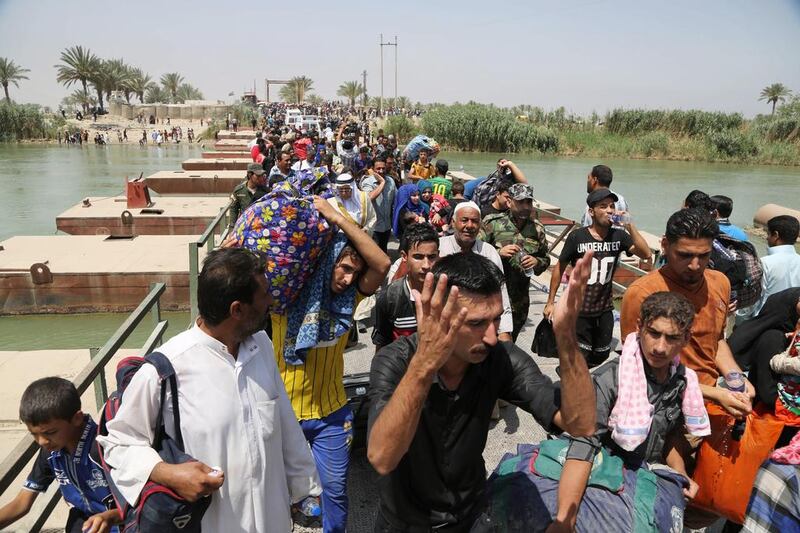BEIRUT // ISIL’s capture of the Iraqi city of Ramadi and the ancient Syrian town of Palmyra are no ordinary conquests.
After weeks of fighting, Ramadi’s fall on Sunday delivered the extremist group control over a strategic highway linking Iraq and Syria, and a haul of weapons abandoned by Iraqi forces.
Three days later, the Al Qaeda breakaway group overran Syrian government troops to seize Palmyra, home to the ruins of a 2,000-year-old city that was one of the most important cultural centres of the ancient world.
With the first anniversary of the declaration of its caliphate a month away, the victories put the militants on the front foot at a time when their leaders are seeking to dispel any sense of weakness after recent defeats.
In Syria, ISIL now controls half of the country’s territory and most of its oil and gas fields, according to the Syrian Observatory for Human Rights, a UK-based group that monitors the conflict.
“The fact [ISIL] is still on the offensive is important, and the timing is important,” said Charlie Winter, a researcher at the counter-radicalisation group Quilliam Foundation in London. Pushed into retreat, “it loses power and all the things that drive people to join it”.
The group’s supporters are already touting its latest feats, Mr Winter said, posing the question on social media: “Last year it was Mosul, this year it’s Ramadi, and where will it be next year?”
For ISIL leader Abu Bakr Al Baghdadi and his commanders, it is a propaganda coup to match their lightning advance across swathes of Syria and Iraq in June last year.
In Iraq, Ramadi’s fall prompted prime minister Haider Al Abadi to turn to Shiite militias, whose abuses elsewhere have fuelled enmity among Sunni tribes toward his government.
The fight to confront ISIL has sought to inflict battlefield losses, counter its appeal to disaffected Muslims and restrict its finances. As it rages, territory under the group’s control comes and goes, said Kamran Bokhari, an adviser for Middle Eastern and South Asian affairs at the Texas-based consulting firm Stratfor.
“If they lose an area, they retain the ability to push into somewhere else,” Mr Bokhari said. Still, while there is “a big hype created in the media regarding Ramadi, on the battleground, it’s business as usual: a few kilometres this way or a few kilometres that way”, he said.
The group has lost more territory in Iraq than it has in Syria, according to Mr Bokhari.
Peshmerga fighters have made advances against ISIL in Kurdish-populated areas of Iraq’s Nineveh province, and the group has lost footholds in the eastern Diyala province. The recapture of Tikrit, on the main north-south highway between Baghdad and Mosul, by government forces marked a strategic blow for the extremists.
In Syria, airstrikes by a US-led coalition helped Kurdish forces repel ISIL fighters from Kobani earlier this year, and more recently from areas around Tal Tamr in Hasakah province. Yet it has made inroads in Deir Ezzour and eastern Homs in addition to capturing Palmyra.
Only two oil and gas fields, the Shaer and Rumeilan, are outside of the group’s control, according to the UK-based Syrian observatory, which monitors the civil war through activists on the ground. ISIL declared the Syrian city of Raqqa as the capital of a self-proclaimed caliphate announced at the end of June.
The group will likely retain control over its heartland, especially in Syria, for the medium term, the risk analysis company Verisk Maplecroft said in a recent research note. It is “especially well-entrenched in Iraq’s Sunni hinterland and eastern Syria, which collectively remains the core of the group’s territory,” it said.
ISIL’s resilience is made possible by its diverse sources of income. After losing control of some oil fields, it relied more heavily on taxation and extortion.
It is also bolstered by an ability to sustain local services and its deftness in convincing Sunnis in Syria and in Iraq that they would be worse off under Shiite governments.
“We see what [ISIL] is doing, the appalling brutality and the ruthlessness, but on the ground it has a complex and sophisticated outreach programme in which it seeks to portray itself as the defender of the Sunnis,” said Mr Winter of the Quilliam Foundation. That “creates big problems for the offensive against it”, he said.
* Bloomberg





